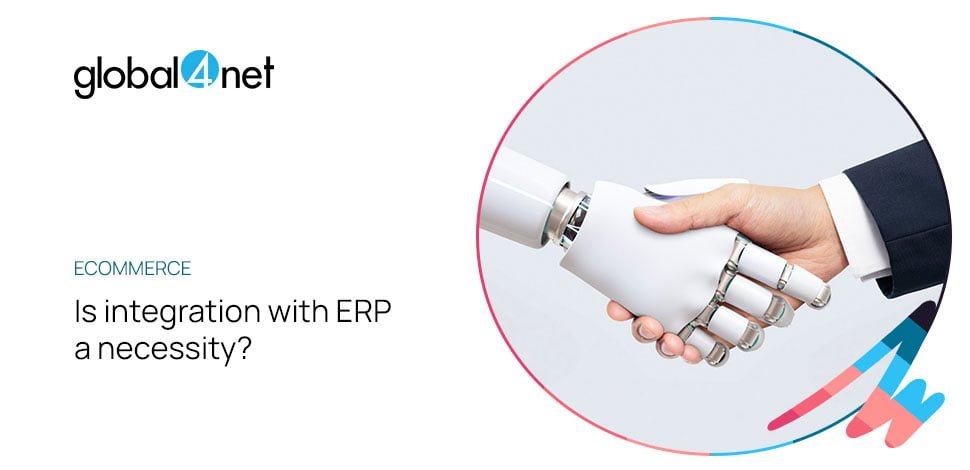ul. Strzegomska 2-4
53-611 Wrocław
NIP 8992786490
KRS 0000608120
REGON 363987723
Global4Net Sp. z o. o.
+48 71 358 41 00
© 2009 – Global4Net. All Rights Reserved.

Today, companies that want to outrun competitors and win the engagement of their target audiences have to provide top-notch customer service and UX. What does it have to do with ERP? These systems help your company manage and even automate crucial business processes. As a result, your company works more effectively and can provide better experiences for its customers. In this blog post, we will explain why you need an ERP system and what are the benefits of integrating your company with ERP.
Every company has to execute tens of processes in order to work effectively and stay competitive. These processes are primarily related to:
Of course, you can deal with these processes manually (and many small companies do!), but in general, it’s far more effective to use software to help you with all that. And that’s where the role of ERP software begins. The ERP acronym stands for Enterprise Resource Planning. These are comprehensive platforms that help you run your business efficiently, primarily in order to satisfy your customers. And that’s the crucial element as for the ERP system to be fully useful, it has to be integrated with other systems in your organization that are more customer-facing. Here, we especially mean CRM, but also other solutions, like your e-commerce platform.
For many users, ERP software is mostly for accounting and financial purposes, but the truth is, these platforms are way more comprehensive. In short, ERP is a business management software that’s used to manage and automate all the crucial business operations – whatever is needed to run a company. Thanks to ERP, you get a single source of information, so everyone in your company can have access to the same, up-to-date data.
That depends on the size of your company and your requirements, but if you run a medium-sized business, the answer is yes. With a well-designed ERP system, you can eliminate redundancies and significantly improve accuracy and productivity. Because everything is interconnected, different departments can synchronize their work and, this way, achieve faster and better outcomes.
And then, there’s the reporting question. All advanced ERP systems come with extensive reporting/analytics modules so that you get an in-depth view of everything that happens if your company. Thanks to that, you can easily spot potential problems or complications.
So yes, ERP is something you definitely want in your company. However, there are a few boxes to tick if you want to make the most of this solution. For starters, you can’t just download an ERP system and start using it. It has to be adjusted to your company’s needs, and that takes time and a lot of experience. Implementing an ERP system can easily take a few weeks, as this system has to be fully integrated with your tools and processes. And speaking of integration – is it really necessary?
ERP integration is all about connecting your ERP system with other tools, applications, and data sources that you use in your company. It’s a prerequisite for the effective operation of your ERP platform. Without these integrations, you wouldn’t get the full picture of your business, which could cause many wrong decisions. This question is especially vital in old companies where some of the systems are developed on-premises, whereas others – in the cloud.
Additionally, the lack of integration between ERP and other systems means that you have to move and send all the necessary information manually, which completely defeats the purpose of having an ERP system. Let’s use a quick example. You run an online store, and there’s a new order on your e-commerce platform. If that platform wasn’t integrated with the ERP system, you’d have to copy-paste information about each new order by hand. That’s just a massive waste of time and unnecessary complication. The same refers to WMS systems – your warehouse needs to be immediately informed of each new order to work efficiently.
Lastly, we have to emphasize that lack of constant communication between ERP and other systems results in delays, which can be truly detrimental to your business. With all these problems going on, you’d never be able to improve your company’s operation (and that was your initial goal, correct?). In other words, when you decide to use an ERP platform in your business, you have to make sure it’s fully integrated with all the software and data sources that you use. Otherwise, it doesn’t make any sense and investment in ERP will never be profitable.
Do you need help with integrating your ERP software with other tools in your company? We will gladly help you with that! Global4Net has experience with integrating various digital tools to work seamlessly together, including ERP and WMS systems. We are at your service.
Write to us




